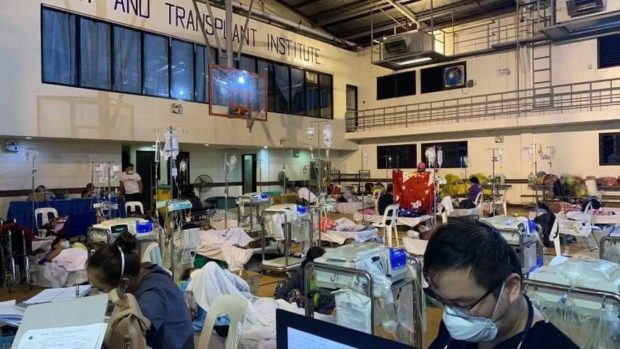Leptospirosis cases swamp NKTI; gym used as ward

DOUBLE WHAMMY Eighty-nine leptospirosis patients have been admitted to the National Kidney and Transplant Institute in Quezon City since Nov. 12 in the aftermath of Typhoon “Ulysses,’’ including nine who have also tested positive for the coronavirus. —PHOTO COURTESY OF NKTI EXECUTIVE DIRECTOR ROSE MARIE LIQUETE
MANILA, Philippines — A surge of leptospirosis cases has swamped the National Kidney and Transplant Institute (NKTI) in Quezon City even as the state-run specialty center strives to handle patients afflicted with the new coronavirus (COVID-19) disease.
The NKTI admitted a total of 78 leptospirosis patients on Tuesday, prompting hospital officials to convert its gym into a ward to accommodate the influx of cases.
NKTI Executive Director Rose Marie Liquete said 89 patients had been admitted since Nov. 12, when Typhoon “Ulysses” (international name: Vamco) ravaged parts of Luzon and left many areas flooded. The number, she said, was more than half of the 163 cases logged since January.
Water-borne disease
Leptospirosis is a bacterial, water-borne disease that can lead to kidney damage, meningitis, liver failure, respiratory distress and even death when not treated properly. It can afflict people exposed to floodwater, mud or food contaminated by urine of infected animals, such as rats, pigs, dogs, cattle and goats.
The NKTI, for the third consecutive year, has used its gym as ward for leptospirosis patients. While the gym is spacious, the number of patients would be limited to at most 40 to maintain physical distancing as part of COVID-19 measures, Liquete said in a phone interview.
Article continues after this advertisementThe converted ward had about 30 patients on Tuesday.
Article continues after this advertisementLiquete said it was important to screen the patients for COVID-19. Of those admitted to the hospital on Tuesday, 11 in the emergency room had yet to be screened for the coronavirus, she said.
So far, she said, nine leptospirosis patients had also tested positive for the coronavirus and were brought to COVID-19-designated wards to prevent further transmission.
Lack of manpower
Despite the latest spike in leptospirosis cases, Liquete said the number “is still manageable.”
While the hospital lacked manpower even before the surge of cases due to the resignation of nurses and those seeking employment abroad, Liquete said it was continuing to assign health workers to critical areas to manage patients.
“[This is why there are] less nurses in noncritical areas. I hope we don’t close wards. The cases are manageable, but most nurses are working overtime,” she said.
Leptospirosis patients show flu-like symptoms like body pains (particularly the calf muscle), weakness and headache.
Before the symptoms are felt, the incubation period can take up to three weeks, Liquete said, noting that it had been weeks since Ulysses caused massive flooding in Luzon and some of the patients came from flood-hit Rizal province.
She said the hospital was hoping that the number of cases would soon decline.
Prophylactic treatment
Liquete said a person w should seek prophylactic treatment or preventive health care within 24 to 72 hours after exposure to contaminated water. Treatment should be longer, from three to five days, if the exposure to dirty water is longer.
Medicine should be available for free at health centers or a government hospital, Liquete said.
The most important factor in preventing the disease is keeping a clean environment, she said.
The Department of Health recorded a total of 981 leptospirosis cases in January to August 2019. The figure was lower than the more than 2,600 cases from January to July 2018.
According to the World Health Organization, the disease is endemic mostly in countries with humid subtropical or tropical climates. It has “epidemic potential” and “often peaks seasonally, sometimes in outbreaks, and is often linked to climate changes, to poor urban slum communities, to occupation or recreational activities.” —WITH A REPORT FROM INQUIRER RESEARCH INQ